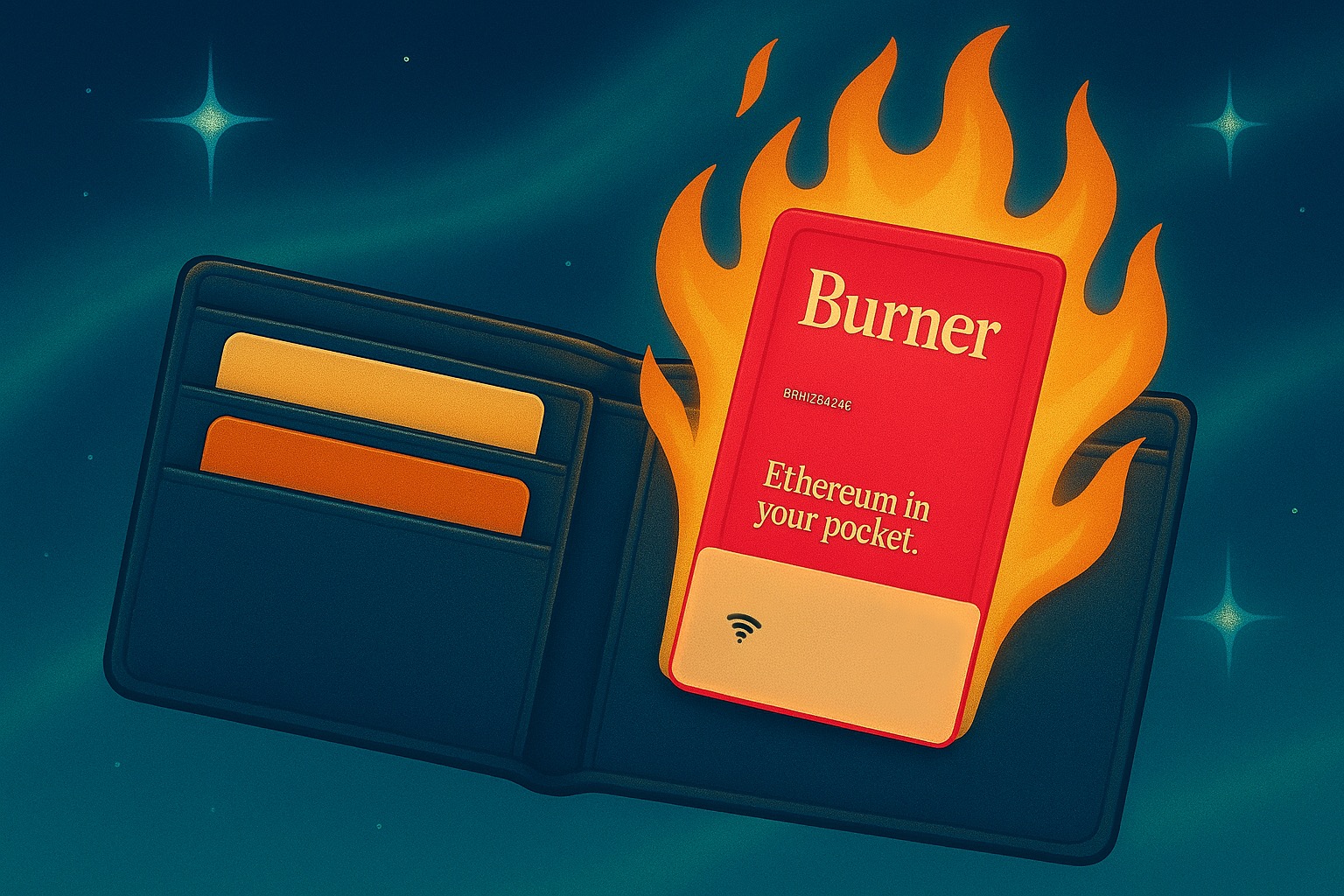The Top Bitcoin Wallets of 2025
Back to articles
Bitcoin remains the most trusted digital asset, with more ways than ever to store and manage it. Whether you’re holding, sending, or trading BTC, your choice wallet matters more than ever. In 2025, wallet options range from secure hardware cold wallets to convenient software hot wallets, so you can choose what fits your needs and budget.
This guide compares the top Bitcoin wallets across form factor, ease of use, security features, and cost. The focus is on non-custodial wallets: wallets that give you real control of your BTC (not your keys, not your crypto). If you’re still storing Bitcoin on a crypto exchange, it’s time to consider a safer approach—read our guide to wallet security to understand why. Whether you’re gifting sats, DCA’ing each week, or managing a sizable stack, you’ll find something in this guide built for your needs.
And remember, the best wallet for you depends on your own habits. Some crypto users value maximum security and cold storage, while others prioritize easy access and mobility.
Bitcoin Wallet Comparison Chart (2025)
Looking for the right Bitcoin wallet? This chart compares key features like secure hardware storage, seedless recovery, mobile-first design, open-source availability, long-term storage suitability, and physical portability. Whether you’re gifting BTC or locking it down for the long haul, you’ll find the right fit here.
| Wallet | Ideal For | Secure Hardware Chip | Open Source | Mobile-First | Seedless | Suitable for Long-term Storage | Fits in Wallet | Cost* |
|---|---|---|---|---|---|---|---|---|
| Burner | Gifting, daily use, onboarding | ✅ Yes | ✅ Yes | ✅ Yes | ✅ Yes | ✅ Yes | ✅ Yes | $19 |
| BlueWallet | Mobile Bitcoin users | ❌ No | ✅ Yes | ✅ Yes | ❌ No | ❌ No | n/a | n/a |
| Exodus | Visual portfolio management | ❌ No | ❌ No | ✅ Yes | ❌ No | ❌ No | n/a | n/a |
| Electrum | Experienced users | ❌ No | ✅ Yes | ❌ No | ❌ No | ❌ No | n/a | n/a |
| Sparrow Wallet | Desktop privacy setups | ❌ No | ✅ Yes | ❌ No | ❌ No | ❌ No | n/a | n/a |
| Wallet of Satoshi | Basic BTC functions | ❌ No | ❌ No | ✅ Yes | ❌ No | ❌ No | n/a | n/a |
| Coinbase Wallet | Coinbase users self-custody | ❌ No | ❌ No | ✅ Yes | ❌ No | ❌ No | n/a | n/a |
| Phantom Wallet | Solana + BTC support | ❌ No | ❌ No | ✅ Yes | ❌ No | ❌ No | n/a | n/a |
| SeedSigner | DIY air-gapped signing | ✅ Yes | ✅ Yes | ❌ No | ❌ No | ✅ Yes | ❌ No | $50 |
| Bitkey | Simple mobile hardware use | ✅ Yes | ✅ Yes (not fully) | ✅ Yes | ❌ No | ✅ Yes | ❌ No | $150 |
| Ledger Nano X | Secure cold storage | ✅ Yes | ❌ No | ❌ No | ❌ No | ✅ Yes | ❌ No | $149 |
| Trezor Model T | Open-source control | ✅ Yes | ✅ Yes | ❌ No | ❌ No | ✅ Yes | ❌ No | $219 |
| Coldcard MK4 | Bitcoin-only cold storage | ✅ Yes | ✅ Yes | ❌ No | ❌ No | ✅ Yes | ❌ No | $167 |
| Blockstream Jade | Open-source QR security | ✅ Yes | ✅ Yes | ❌ No | ❌ No | ✅ Yes | ❌ No | $64 |
| SafePal S1 | QR-based offline storage | ✅ Yes | ❌ No | ❌ No | ❌ No | ✅ Yes | ❌ No | $49 |
Note: Prices reflect standard retail pricing at the time of publication and may vary.
Wallet Breakdown: Who They’re Best For, and Why
From gifting to long-term storage, here’s how the top Bitcoin wallets stack up—so you can choose the one that makes managing your BTC simple and secure.
Burner Bitcoin Hardware Wallet

Burner Bitcoin is a slim, credit-card-sized hardware wallet and physical device designed for real-world usability. It uses secure chip technology and PIN protection, with no seed phrase to store and no app to install. Just tap to launch in your browser and go.
Burner is designed for crypto users who want to give or spend Bitcoin easily, whether you’re helping someone take their first step into digital assets or gifting BTC to a friend. Unlike most hardware wallets, Burner is simple and accessible, making it an ideal choice for beginners, yet still secure and capable enough for experienced users who want the highest protection.
BurnerOS: A Wallet That Runs in Your Browser
BurnerOS is the browser-based software that powers Burner. Tap your card, and BurnerOS opens instantly—no downloads, no updates, no login headaches.

You can view your balance, send and receive Bitcoin, all from a clean, tap-to-use interface that’s simple enough for first-time users. Because it runs in the browser and updates automatically, there’s no risky software wallet to install. BurnerOS delivers the convenience of a hot wallet while significantly reducing exposure to online threats.
BlueWallet Software Wallet
BlueWallet is an open-source Bitcoin wallet app for mobile devices. It offers multiple wallet options and gives users flexibility over how they manage and move their Bitcoin, with additional controls over fees and transactions. Some features may be more advanced than most users need, but BlueWallet is well-suited for those looking for a broad feature set on mobile. Like other software wallets, BlueWallet does not use a secure hardware chip.
Exodus Software Wallet
Exodus is a software wallet supporting Bitcoin and other digital assets. Its UI is straightforward and may appeal to users who are newer to managing cryptocurrencies. Many users find it an approachable entry point for handling Bitcoin and other crypto assets. However, Exodus is not open-source, which may be a drawback for those prioritizing transparency and code audits. Like all software wallets, Exodus does not include a secure chip, so it lacks the protection offered by hardware wallets.
Electrum Software Wallet
Electrum is one of the earliest open-source Bitcoin wallets, known for its flexibility in how users can manage their Bitcoin. Its design and options cater to those comfortable navigating a more traditional interface and technical settings. While Electrum’s user experience may feel less modern than newer wallets and involves a steeper learning curve, it remains an option for users who want direct control over their funds. Like other software wallets, Electrum does not include a secure hardware chip.
Sparrow Wallet Software Wallet
Sparrow Wallet is an open-source Bitcoin wallet for desktop focused on detailed transaction insight, privacy, and flexibility in setup. It offers users a high degree of visibility into their Bitcoin holdings and supports advanced privacy tools for those who want them. Sparrow does not have a mobile app and some settings may be more technical, but it appeals to users looking for deeper control. Like all desktop software wallets, Sparrow does not include a secure hardware chip.
Wallet of Satoshi Software Wallet
Wallet of Satoshi is a mobile wallet designed for simplicity. It handles everything on the backend so users can send and receive Bitcoin with minimal effort. However, it’s not self-custodial, meaning users don’t control their private keys. It also lacks a secure hardware chip, making it less suitable for long-term storage or users who prioritize security.
Coinbase Wallet (previously BRD Wallet) Software Wallet
Coinbase Wallet is a non-custodial software wallet built by Coinbase. In 2021, Coinbase acquired BRD (formerly BreadWallet), a long-standing Bitcoin wallet. While the interface is clean and accessible, Coinbase Wallet lacks a secure hardware chip and still relies on seed phrases for recovery. It’s best suited for users already in the Coinbase ecosystem who want a smooth transition into self-custody.
Phantom Wallet Software Wallet
Phantom began as a Solana wallet and is available on both desktop and mobile. It now also supports Bitcoin and Ethereum, and offers features such as in-app token swaps and phishing protection, though it still relies on seed phrases for recovery.
SeedSigner Hardware Wallet
SeedSigner is a build-it-yourself signing device made from off-the-shelf parts. It uses QR codes to sign Bitcoin transactions offline, keeping it fully air-gapped. The project is open-source and appeals to privacy-focused users who want full control over their signing setup. While not the most convenient for daily use, it offers a high level of transparency and operational isolation.
Bitkey Hardware Wallet
Bitkey is a Bitcoin-only wallet developed by the team behind Square and Cash App. It includes a mobile app, hardware device, and recovery system designed to help users regain access if they lose part of their setup. While it uses a secure element chip, Bitkey is not fully open-source, which may be a drawback for users who prioritize transparency and independent code audits.
Ledger Nano X Hardware Wallet
Ledger Nano X is a Bluetooth-enabled hardware wallet built for secure, offline storage of Bitcoin and other crypto assets. It pairs with Ledger Live for desktop portfolio management. While it’s a popular choice among advanced users, it’s less suited for everyday use or Bitcoin gifting due to its reliance on a recovery phrase and complex setup.
Trezor Model T Hardware Wallet
Trezor Model T is a touchscreen hardware wallet with open-source firmware, offering transparency and detailed control over your Bitcoin and other crypto assets. It supports a broad set of cryptocurrencies and connects with Trezor Suite for advanced security features. Best suited for experienced users, it’s built for those who value maximum control and offline storage.
Coldcard MK4 Hardware Wallet
Coldcard MK4 is a hardware wallet dedicated exclusively to Bitcoin, built for long-term offline storage. It uses air-gapped transaction signing and includes a secure element for added protection. With its open-source design and advanced security features, Coldcard appeals to users who want full control over their Bitcoin. The interface and setup are more technical, making it less suited for beginners.
Blockstream Jade Hardware Wallet
Blockstream Jade is a hardware wallet designed for secure, offline storage of Bitcoin. Transactions are signed using QR codes instead of USB or Bluetooth. Its open-source design makes it an option for users who prioritize transparency and want a fully air-gapped solution.
SafePal S1 Hardware Wallet
SafePal S1 is a hardware wallet that signs Bitcoin transactions using QR codes, avoiding USB and Bluetooth connections entirely. It supports a wide range of crypto assets and is designed to deliver strong offline security, making it a good option for users seeking enhanced protection and a fully air-gapped storage experience.
Final Thoughts: Bitcoin Wallets Built for Real Ownership
The whole point of Bitcoin was to put real ownership back in your hands: self-custody, not relying on a third party or crypto exchange to hold your money. That’s the vision Satoshi had when he launched the first blockchain.
Satoshi didn’t invent Bitcoin so you could leave your coins on an exchange. He wanted everyone using a non-custodial wallet—ideally a secure hardware one.
Burner Bitcoin is what self-custody looks like when it’s finally simple. No seed phrase. No confusing setup. No unnecessary steps. It makes Bitcoin ownership easy enough for anyone—even complete beginners.
When self-custody is this easy, everyone can finally truly own their Bitcoin.
FAQ: Choosing the Right Bitcoin Wallet
❓ What is the safest way to store Bitcoin?
The safest method is using a hardware wallet with offline (cold) storage. Devices like Burner Bitcoin, Ledger, Trezor, SeedSigner, and Blockstream Jade keep your private keys off the internet, reducing exposure to online threats.
❓ What’s the difference between a hardware wallet and a software wallet?
A hardware wallet is a physical device that stores your Bitcoin offline—often called cold storage—for maximum security (e.g., Burner Bitcoin, Ledger Nano X, Trezor Model T). A software wallet is an internet-connected app—commonly referred to as a hot wallet—that offers easier access but increases exposure to online risks (e.g., BlueWallet, Exodus, Electrum). Burner Bitcoin combines the strengths of both: it’s a secure hardware wallet that works like a hot wallet, running in your browser with no seed phrase and no complicated setup.
❓ What makes Burner Bitcoin different from other wallets?
Burner Bitcoin is a seedless, PIN-protected hardware wallet that works like a tap-to-use card and runs in your browser. No apps, no downloads, no seed phrase to manage. It offers the simplicity of a software wallet with the security benefits of hardware—ideal for beginners, gifting, or fast access.
❓ Can I gift Bitcoin with Burner?
Definately! Burner Bitcoin is designed for gifting and onboarding. Just load the card and hand it off—no apps, passwords, or confusing steps required.
❓ Do I need an app to use Burner Bitcoin?
No. Burner Bitcoin runs entirely in your browser through BurnerOS. There’s nothing to download, install, or update.
❓ What happens if I lose my Burner Bitcoin?
Burner Bitcoin uses PIN-based access instead of seed phrases, reducing the risk of accidental loss or theft. For added peace of mind, we recommend using the Card Duplicator in BurnerOS to create a backup card and storing it separately in a secure place, especially if you’re holding larger amounts of BTC. Without a backup, lost cards cannot be recovered.
❓ Does Burner support anything besides Bitcoin?
Yes. While Burner Bitcoin is designed specifically for BTC, there is also a version of Burner that supports Ethereum and stablecoins like USD II. Learn more at burner.pro/eth.

Get your Burner
What to read next
Back to articlesWhat is a Burner Card? From Disposable Payments to Simple, Secure Crypto Self-Custody
The term “burner card” began in fintech as a disposable virtual card for secure payments, then evolved into temporary crypto wallets for low-risk use. Today, it means something new: a physical hardware wallet that is secure, seedless, built for daily use and gifting, and affordable enough to easily replace if necessary.
The 10 Best Wallets for Onboarding to Base in 2025
Navigating wallets for the Base network doesn’t need to feel overwhelming. This guide simplifies your choice by comparing the best crypto wallets for onboarding to Base in 2025, including mobile apps, browser extensions, and the simple, secure solution of Burner wallet and USD II, built for everyday use.
Top Stablecoins of 2025: An Investor's Guide
Looking to strike the right balance in your crypto portfolio? Stablecoins are making it easier than ever for investors to manage risk, move funds, and earn yield—without the price swings of traditional cryptocurrencies. This guide breaks down the top stablecoins on Ethereum and Base, compares features, and highlights practical use cases like payments, gifting, and DeFi. Discover which stablecoins offer the stability, flexibility, and balance you need for 2025.


